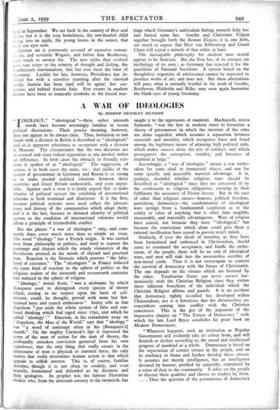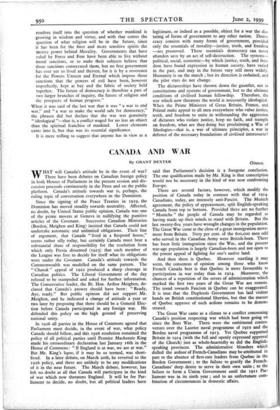A WAR OF IDEOLOGIES
By BISHOP HENSLEY HENSON
TDEOLOGY," " ideological "—these rather uncouth 1 words have become arrestingly familiar in recent political discussions. Their precise meaning, however, does not appear to be always clear. Thus, hesitation to join hands with a dictator in Berlin is described as " ideological," and so is apparent reluctance to co-operate with a dictator in Moscow. The circumstance that the two dictators are in avowed and even violent opposition to one another makes no difference. In both cases the obstacle to friendly rela- tions is spoken of as " ideological." The suggestion, of course, is in both cases the same, viz.: that dislike of the system of government in Germany and Russia is so strong as to make normal political relations between those countries and Great Britain undesirable, and even impos- sible. Against such a view it is justly argued that to make identity of political system the condition of international relations is both irrational and disastrous. It is the first, because political systems must need reflect the idiosyn- crasy and history of the communities which adopt them; and it is the last, because to demand identity of political system as the condition of international relations would affirm a principle of irremediable conflict.
But the phrase " a war of ideologies " may, and com- monly does, cover much more than so simple an issue. The word " ideology " has a French origin. It was carried over from philosophy to politics, and used to express the contempt and disgust which the windy visionaries of the Revolution aroused in the minds of shrewd and practical men. Reaction is the Nemesis which pursues " the false- hood of extremes." The " ideologues " in France induced the same kind of reaction in the sphere of politics as the religious zealots of the sixteenth and seventeenth centuries had induced in the sphere of religion.
" Ideology," writes Scott, " was a nickname by which Bonaparte used to distinguish every species of theory which, resting in no respect upon the basis of self- interest, could, he thought, prevail with none but hot- brained boys and crazed enthusiasts." Seeley tells us that Napoleon " put aside the whole system of false and con- fused thinking which had raged since 1792, and which he called ' ideology '." Emerson, in his remarkable essay on Napoleon, the Man of the World," says that " ideology " was " a word of contempt often in his IBonaparte's] mouth." On the mighty Corsican's lips it expressed the scorn of the man of action for the man of theory, the profoundly mistaken conviction garnered from his own experience, that the only thing that really counts in the intercourse of men is physical or material force, the only motive that really determines human action is that which appeals to selfish interest. This is, of course, familiar doctrine, though it is not often so crudely, and even brutally, formulated and defended as by dictators and their apologists. Its prophet was the famous Florentine thinker who, from the sixteenth century to the twentieth, has taught it to the oppressors of mankind. Machiavelli, writes Symonds, " was the first in modern times to formulate a theory of government in which the interests of the ruler are alone regarded, which assumes a separation between statecraft and morality, which recognises force and fraud among the legitimate means of attaining high political ends, which makes success alone the test of conduct, and which presupposes the corruption, venality, and baseness of mankind at large."
Accordingly, a " war of ideologies " means a war under- taken for some ideal or immaterial object, and not for some specific and accessible material advantage. It is, perhaps, doubtful whether religious wars should be described as " ideological " since they are conceived of by the combatants as religious obligations, carrying in their fulfilment the assurance of Divine favour. But in the case of other than religious causes—honour, political freedom, patriotism, democracy—the condemnation of ideological wars springs from a fundamental scepticism as to the reality or value of anything that is other than tangible, measurable, and materially advantageous. Wars of religion have ceased, not because they were " ideological," but because the convictions which alone could give them a rational justification have ceased to govern men's minds.
Similarly, if ever the ideals of morality, as they have been formulated and embraced in Christendom, should cease to command the acceptance, and kindle the enthu- siasm, of the people, there will be an end of ideological wars, and men will sink into the measureless servility of non-moral cattle. Thus it is not extravagant to connect the survival of democracy with the future of Christianity. The one depends on the virtues which are fostered by the other. Totalitarian States can never coexist har- moniously with the Christian Religion since they violate those inherent franchises of the individual which the Christian Religion affirms and guards. It is no accident that democracy rightly so-called has developed within Christendom; nor is it fortuitous that the dictatorships are everywhere coming into conflict with the Christian conscience. This is the gist of the argument of the impressive chapter on " The Future of Democracy " with which the late Lord Bryce concludes his great book on Modern Democracies.
" Whatever happens, such an institution as Popular Government will evidently take its colour front, and will flourish or decline according to, the moral and intellectual progress of mankind as a whole. Democracy is based on the expectation of certain virtues in the people, and on its tendency to foster and further develop those virtues. It assumes not merely intelligence, but an intelligence elevated by honour, purified by sympathy, stimulated by a sense of duty to the community. It relies on the people to discern these qualities and choose its leaders by them. . . . Thus the question of the permanence of democracy resolves itself into the question of whether mankind is growing in wisdom and virtue, and with that comes the question of what religion will be in the future, since it has been for the finer and more sensitive spirits the motive power behind Morality. Governments that have ruled by Force and Fear have been able to live without moral sanctions, or to make their subjects believe that those sanctions consecrated them, but no free government has ever yet so lived and thriven, for it is by a reverence for the Powers Unseen and Eternal which impose those sanctions that the powers of evil have been, however imperfectly, kept at bay and the fabric of society held together. The future of democracy is therefore a part of two larger branches of inquiry, the future of religion and the prospects of human progress."
When it was said of the last war that it was " a war to end war," and " a war to make the world safe for democracy," the phrases did but declare that the war was genuinely " ideological "—that is, a conflict waged for no less an object than the spiritual franchise of mankind. Lower elements came into it, but that was its essential significance.
It is mere trifling to suggest that anyone has in view as a legitimate, or indeed as a possible, object for d war the dic- tating of forms of government to any other nation. Demo- cracy consists with many forms of government, provided only the essentials of morality—justice, truth, and freedom —are preserved. These essentials democracy can never abandon save by an act of self-destruction. The systems— political, social, economic—by which justice, truth, and free- dom have found expression in human society, have varied in the past, and may in the future vary still more widely. Humanity is on the march ; but its direction is ordained, and the pilot stars do not change.
The dictatorships have thrown down the gauntlet, not to constitutions and systems of government, but to the ultimate conditions of civilised human fellowship. Therefore, the war which now threatens the world is necessarily ideological. When the Prime Ministers of Great Britain, France, and Poland make appeal to all men everywhere who value justice, truth, and freedom to unite in withstanding the aggression of dictators who violate justice, keep no faith, and trample on freedom, what are they doing but proclaiming a War of Ideologies—that is, a war of ultimate principles, a war in defence of the necessary foundations of civilised intercourse?











































 Previous page
Previous page